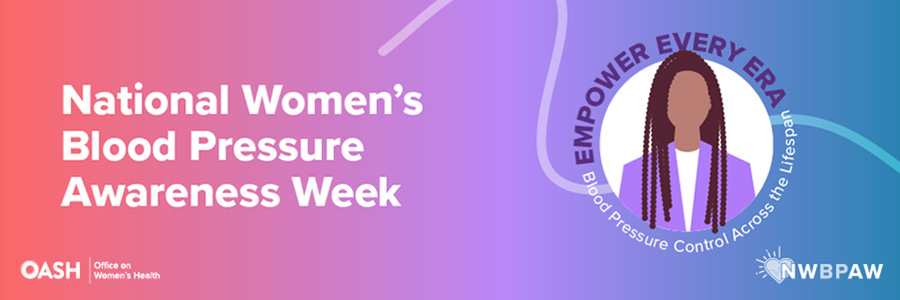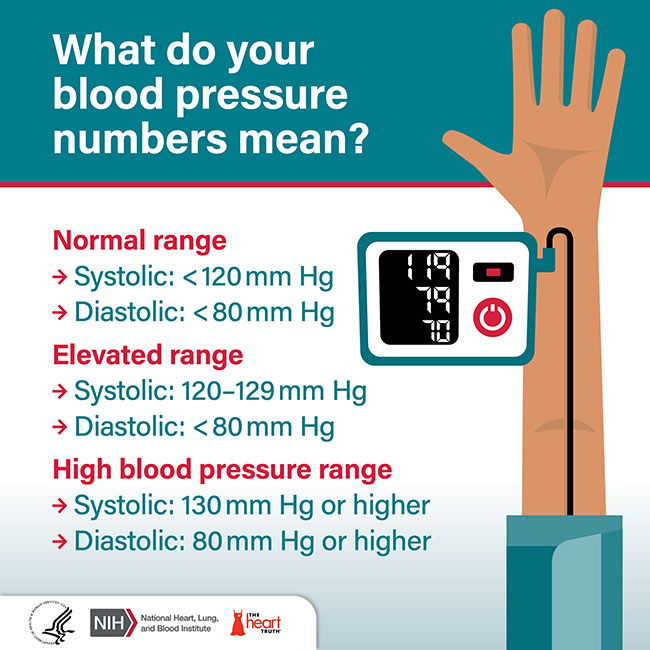
This October, the U.S. Department of Health and Human Services’ Office on Women’s Health (OWH) is leading the 5th Annual National Women’s Blood Pressure Awareness Week (NWBPAW) to improve women’s health outcomes related to hypertension, or high blood pressure. This year’s observance takes place from October 13 to October 19.
High blood pressure is common and can lead to serious health problems such as aneurysms, kidney disease, heart attacks, and strokes, but many women who have or are at risk for developing high blood pressure aren’t aware of their blood pressure levels.
NWBPAW 2024 Theme — Empower Every Era: Blood Pressure Control Across the Lifespan

This year’s theme emphasizes the importance of monitoring and controlling blood pressure across every stage of life and addressing the unique health challenges that many women face from young adulthood to menopause and beyond. The theme also aims to highlight and address heart health disparities, especially in underserved and underrepresented communities. OWH encourages women to check their blood pressure, understand their numbers, and take steps to keep their hearts healthy at every age.
Focus Areas for NWBPAW 2024:
- Blood Pressure Control in Early Adulthood
- Blood Pressure Considerations During Pregnancy and Postpartum
- Menopause and Heart Health
- High Blood Pressure and Health Equity
Blood Pressure Facts
Almost 60 million women (46%) in the United States have high blood pressure, including 1 in 5 women of reproductive age. Despite this, high blood pressure is often underdiagnosed in women, and less than 1 in 4 women have their blood pressure under control.
Certain characteristics and conditions can put women at a higher risk for high blood pressure. Black women are more likely to experience high blood pressure than White, Asian, and Hispanic women, while women who had high blood pressure during pregnancy have a greater risk of developing high blood pressure later in life. Women with disabilities are also more likely to experience high blood pressure at some point in their lives compared with women without disabilities.
High blood pressure isn’t caused by being male or female, but factors such as pregnancy, birth control, and menopause can affect women’s blood pressure. High blood pressure is also a major risk factor for heart disease, which is the leading cause of death for women in the U.S.
Understanding Blood Pressure

NIH National Heart, Lung, and Blood Institute
Blood pressure is measured in millimeters of mercury (mm Hg) and is recorded with two numbers:
- Systolic pressure (the top number): the pressure on your blood vessels when your heart beats.
- Diastolic pressure (the bottom number): the pressure on your blood vessels when your heart rests between beats
High blood pressure happens when the force of the blood pushing against the walls of the blood vessels is too great, damaging the vessels and creating health issues. High blood pressure is diagnosed with a blood pressure check done by a health care provider.
Understanding your blood pressure numbers can help prevent serious heart problems. High blood pressure often has no symptoms, so checking your blood pressure regularly is important to catch any issues early. If your blood pressure is not under control, you can be at risk for heart disease, stroke, kidney issues, and other health problems.
Risk Factors for High Blood Pressure
Many factors can increase your chances of having high blood pressure. Some of these you can improve, and others cannot be controlled.
Uncontrollable Risk Factors
- Social factors, such as income level, educational attainment, and access to health care
- Age
- Race or ethnicity
- A family history of high blood pressure
- Certain health conditions, such as diabetes and kidney disease
- Pregnancy
- Effects of birth control medications
- Menopause
Controllable Risk Factors
- An unhealthy diet
- A lack of physical activity
- Increased body weight or obesity
- Alcohol consumption
- Smoking, vaping, and tobacco use
Preventing and Controlling High Blood Pressure
Make heart-healthy choices: Eating a healthy diet, being physically active, managing stress, and getting enough sleep can help lower your blood pressure. Avoiding behaviors such as drinking alcohol and smoking can also help keep your blood pressure in a healthy range.
Get regular checkups: Knowing your numbers is the first step to healthy blood pressure. Regular visits to your health care provider can help you monitor and control your blood pressure. Your care team can work with you to create a plan to keep your blood pressure on track and answer your questions.


